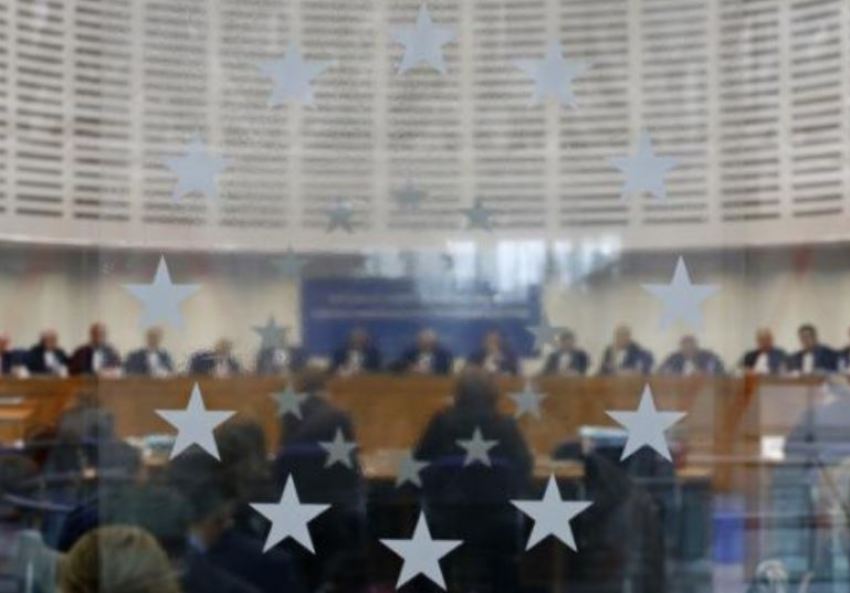European court says feminist who pretended to abort Jesus on the altar was exercising ‘freedom’

Overturning the verdict of a French court, the European Court of Human Rights ruled that a feminist who interrupted the rehearsal of Christmas carols to perform a topless act of aborting Jesus on the altar of a Paris church was exercising "freedom of expression."
Bare-breasted and covered in pro-abortion slogans, Eloïse Bouton entered the La Madeleine church in December 2013 and simulated aborting Jesus in protest of the Catholic Church's teaching against abortion.
Bouton, a former member of the group Femen, stood in front of the altar, wearing a blue veil to mock the Virgin Mary and carried pieces of animal liver to represent an aborted fetus. She acted out an "abortion" before urinating on the ground before those in attendance.
After Bouton's act, Femen wrote on social media that "Christmas is cancelled!" and that "the holy mother Eloïse has just aborted the embryo of Jesus on the altar of the Madeleine."
After the church's priest filed a complaint, a national court found Bouton guilty of "sexual display" and ordered her to pay the parish 2,000 euros. She was sentenced to one month in prison. The Court of Cassation, the highest judicial court in France, upheld the judgment.
In an Oct. 13 opinion, the European Court of Human Rights argued that France violated Article 10 of the European Convention on Human Rights, which protects freedom of expression.
"The applicant considers that far from being gratuitously offensive or seeking to disturb those present in the church in the practice of their worship, her action was part of a public debate on the place of women in society and aimed to convey a message about the position of the Catholic Church regarding abortion," the court's opinion states. "As such, it recalls that the protection of Article 10 must extend to ideas which offend or shock any section of the population."
The court, which the Council of Europe tasks to interpret the European Convention on Human Rights, also accepted the argument that public nudity "can be considered one of the forms of freedom of expression."
"The Court notes that the applicant's conviction was based on the characterization of the offense of sexual exhibition. According to the Government, it was not intended to sanction [her] critical ideas and opinions on the doctrine of the Catholic Church," the opinion reads.
"Nevertheless, the Court considers, as it has mentioned above ..., that in view of its militant nature, the action of the applicant, who sought to express her political convictions, in line with the positions defended by the Femen movement on whose behalf she was acting, must be regarded as constituting a 'performance' falling within the scope of the article."
The Strasbourg-based court ordered France to pay Bouton 9,800 euros (approximately $9,584) for moral damages, legal costs and expenses.
The ECHR's ruling has drawn criticism from conservative religious organizations.
"It is becoming a habit at the ECHR to defend these attacks in churches and against the Church," Grégor Puppinck, the director of the European Centre for Law and Justice, wrote on the group's website.
"In 2018, it had already ruled that the blasphemous provocation of the feminist punk group, the 'Pussy riots,' in the choir of the Orthodox Cathedral in Moscow was a form of expression protected by the Court. The Pussy riots' lawyer, formerly working for [George] Soros foundation, has since become a judge at the ECHR. The same year, the Court also condemned Lithuania for sanctioning blasphemous advertisements featuring Christ and the Virgin Mary."
Puppinck wrote that the ECHR's position is "different when it comes to Islam."
"In 2018, the ECHR upheld the criminal conviction of an Austrian lecturer who was accused of having equated Mohammed's sexual relationship with Aisha, then only 9 years old, with 'paedophilia,'" he wrote.
"The ECHR ruled that the lecturer had not sought to inform the public objectively but to 'demonstrate that Muhammad is not worthy of worship.' In support of this conviction, the Court considered that to speak of 'paedophile' would be a 'generalisation without any factual basis,' 'likely to arouse justified indignation' among Muslims. According to the Court, these remarks constituted 'a malicious violation of the spirit of tolerance that underpins democratic society' and were likely to 'stir up prejudice' and 'endanger religious peace.'"



























